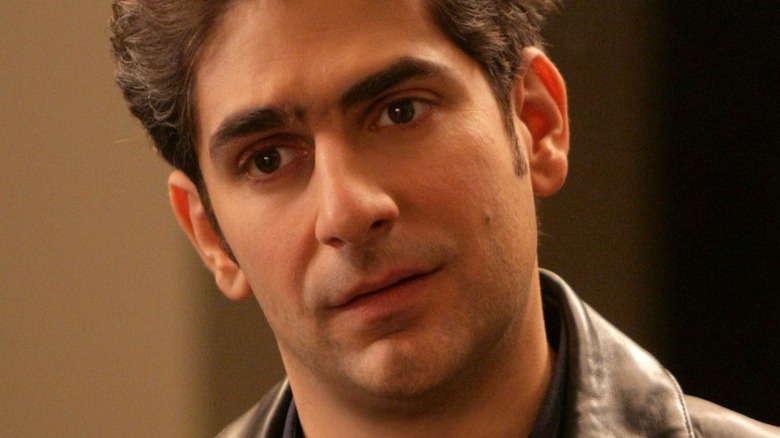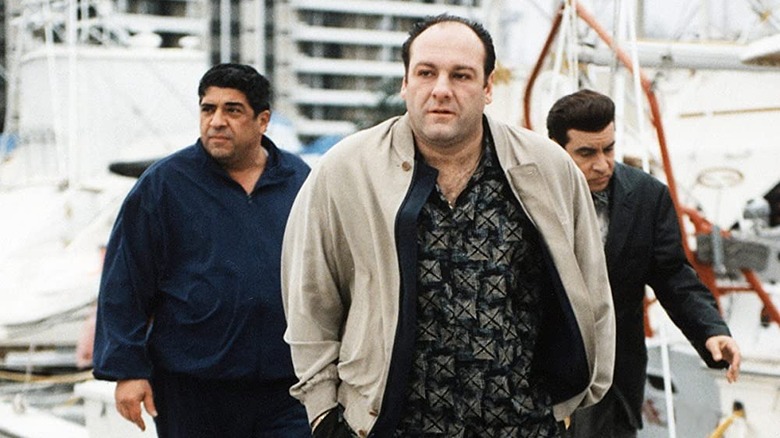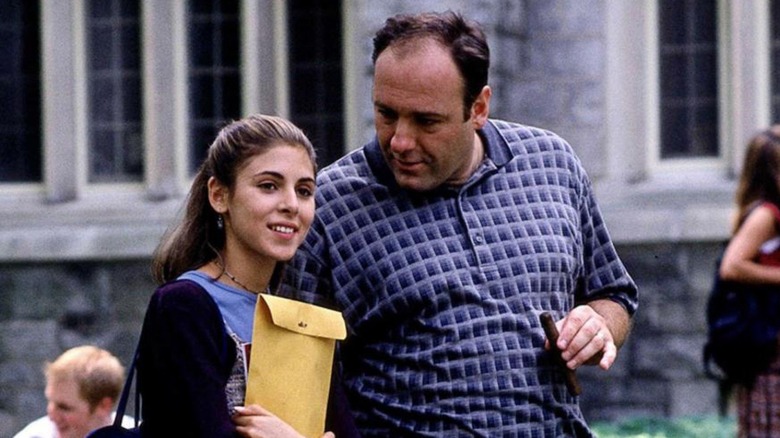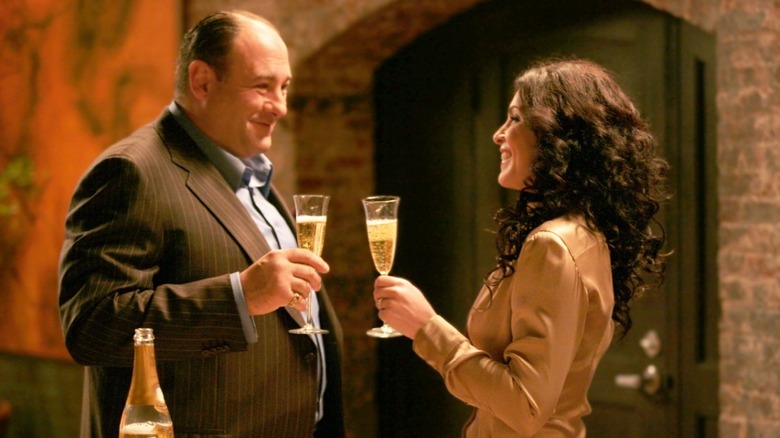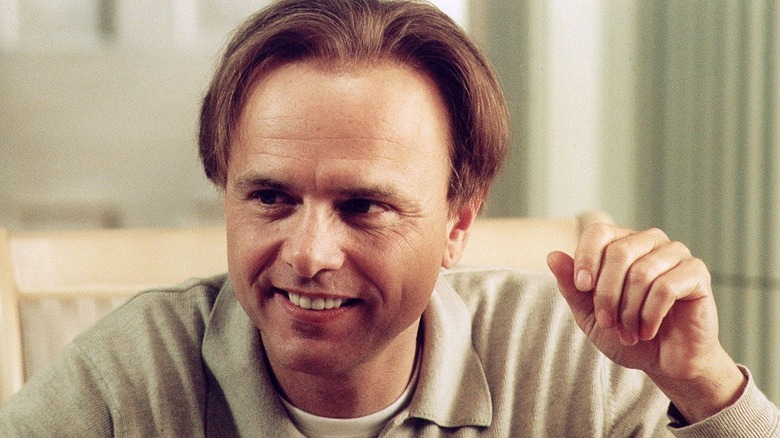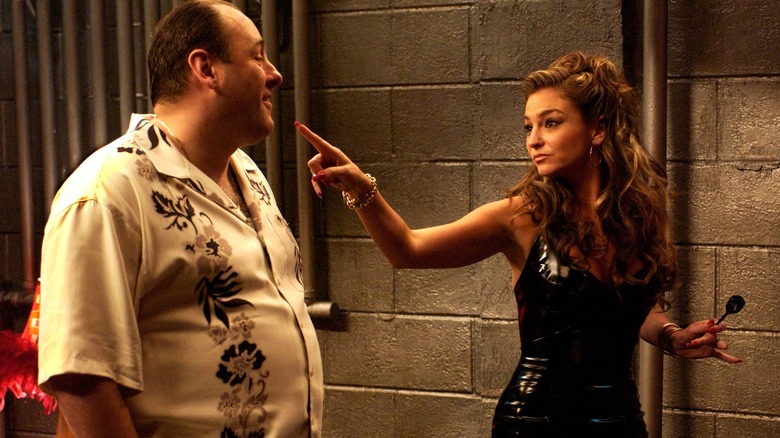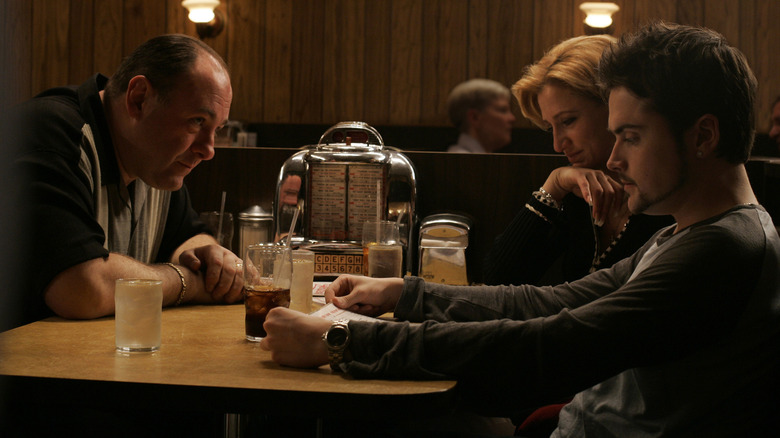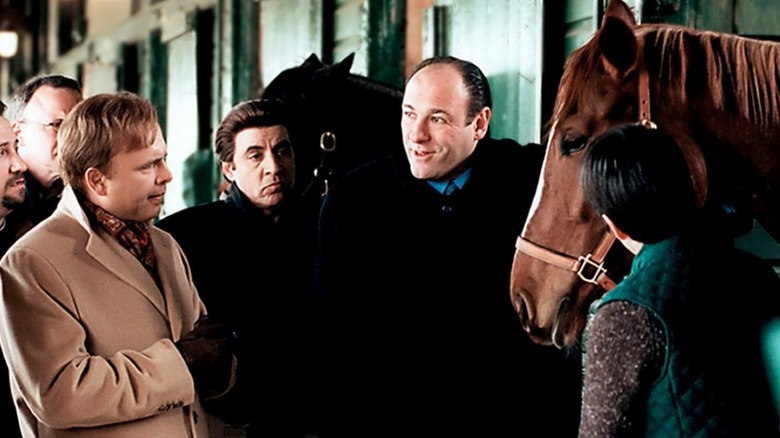Every Season Of The Sopranos Ranked Worst To Best
One of the most influential television shows ever, "The Sopranos" is generally credited with ushering in the so-called Golden Age of TV in the 2000s.
We could argue this Golden Age of TV — essentially referring to a renaissance of hour-long cable dramas — ended with Daenerys Targaryen burning down King's Landing. We could also suggest that it remains ongoing, and will continue for at least two more seasons of "Succession." Regardless, premium cable's potential as a platform for high-quality serialized storytelling was not fully appreciated until David Chase and James Gandolfini entered the zeitgeist in 1999.
There are no bad seasons of "The Sopranos," but every batch of episodes has its own distinct themes and, in many cases, characters. It's probably fair to say the show becomes a perpetually refined version of itself over the course of its roughly seven and a half years on the air. Some folks will tell you it isn't quite fully "The Sopranos" until Season 3. On the other hand, Nancy Marchand stans would claim Season 2 is when the show went downhill. It's all a matter of perspective!
Because it's important for readers to know where we stand on such matters, we're ranking the seasons of "The Sopranos" according to our own admittedly subjective and unscientific opinions.
What's that? You say you still haven't gotten around to watching "The Sopranos?" Well, because we don't want to discourage anyone from experiencing an important piece of American television, we'll go light on spoilers this time.
7. Season 2
Even though Season 2 contains classic episodes as well as series highlight performances by Aida Turturro as family black sheep Janice Soprano and Vincent Pastore as the loyal and very trustworthy DiMeo family lieutenant Sal "Big Pussy" Bonpensiero — well, we had to pick a season to be the "worst."
While Richie Aprile (David Proval) functions as a perfectly fine psychotic antagonist to charismatic mob boss Tony Soprano (Gandolfini), Richie scans within the context of the entire series like a trial balloon for irredeemably fiendish Ralph Cifaretto (Joe Pantoliano), who doesn't arrive until Season 3. Likewise, Tony's dream sequence in the season finale feels like a practice run for much more effective Lynchian divergences to come, despite its paradigm-altering ramifications and hilarious talking fish.
The last thing we'll say about Season 2 is that it includes "D-Girl" — guest starring Jon Favreau, Sandra Bernhard, and Janeane Garofalo, all playing themselves during mob upstart Christopher Moltisanti's (Michael Imperioli) visit to a Los Angeles movie studio. Some folks say "D-Girl" plays out like "The Sopranos" turning into a quasi-self-aware late '90s USA Network knockoff version of itself for an hour. Then again, other folks think "D-Girl" is one of the best episodes of the whole series. Maybe it's up to you to make up your own mind in this regard.
6. Season 1
Tony starts visiting Dr. Jennifer Melfi (Lorraine Bracco), hoping to cure the panic attacks he's experienced since childhood. Meanwhile, Tony's mother Livia Soprano (Marchand) plans her revenge from the nursing home in which she does not believe she belongs. In the untouchable Episode 5, "College," Tony's work life clashes with his daughter Meadow's (Jamie-Lynn Sigler) academic ambitions.
Naturally, the first season of "The Sopranos" blew minds back in 1999. Previously, HBO was known principally as a channel where swearing, nudity, and graphic violence was permissible. While "The Sopranos" year 1 has plenty of f-bombs, topless women, and brutal executions, David Chase and his creative team opted not to treat their prospective audience like morons. In the process, they redefined HBO's reputation as a channel with original content for people who appreciated thought-provoking fiction, as well as nudity and blood.
All that said, Season 1 loses a few points for teasing an affair between Tony's wife Carmela (Edie Falco) and the dubiously devout Father Phil Intintola (Michael Santoro/Paul Schulze) — a subplot that would have been too goofy to fly on the more fully realized version of "The Sopranos" that follows in later years.
5. Season 6A
David Chase's lack of interest in producing a crowd-pleasing final season is the stuff of pop culture legend, but "The Sopranos" starts defying expectations way, way before "Don't Stop Believin'" cues up.
In the first half of the double-length final season (or simply the second-to-last season, if you refuse to accept HBO's propaganda), Tony spends the initial handful of episodes in a coma, teetering on the edge of the great beyond. Later, formerly respected capo Vito Spatafore (Joseph R. Gannascoli) gets shoved out of the closet, and flees to New Hampshire to hide from hyper-macho reprisals. Meanwhile, alluring corporate real estate agent Julianna Skiff (Julianna Margulies) stretches out the existing rift between Tony and Christopher.
By this point, the audience knows their remaining time with "The Sopranos" is dwindling; ergo, dream sequences and pushing characters outside of the show's core circle to the forefront all scan like creative risks. Devoting a substantial amount of screen time to Vito — who's a very far cry from any gay stereotype we're aware of — is a relatively progressive choice for a 2006 show about "tough guys." But while the gambles all pay off and the detours always feel purposeful, this season leaves some fan favorites in the lurch. Melfi, for example, doesn't have much to do this year except sit in her chair and listen to Tony complain.
4. Season 3
In the third year of "The Sopranos," Tony's headaches mostly originate from within the DiMeo crime family. Jackie Aprile Jr. (Jason Cerbone), the entitled scion of Tony's deceased predecessor, starts dating Meadow. If that wasn't bad enough, Ralph — one of television's all-time most loathsome dirtbags — returns to New Jersey.
Christopher and Paulie's (Tony Sirico) slapstick hijinks make Episode 11, "Pine Barrens," probably the series' funniest hour, but if anyone in the audience still clings to some notion that these mobsters are fun, cool, admirable guys, then Episode 6, "University," should disabuse them of that idea. Ralph takes the show's omnipresent cycle of violence to a whole new nadir of casual atrocity. Tony briefly ruminates upon his indirect but essential role in Ralph's behavior; then Tony goes back to doing what he was doing before and makes no change.
Season 3's darker direction, which carries on through the rest of the series, arguably begins with Episode 4, "Employee of the Month" — a profoundly upsetting story containing some of Lorraine Bracco's finest work on "The Sopranos."
Cerbone is not the strongest actor, although his limited emotional range suits Jackie Jr.'s sociopathic, delusional sense of self-importance. It's only because circumstances force Jackie Jr. into the highly competitive category of "Sopranos" Big Bads that Season 3 doesn't quite make our top three.
Jackie Jr.'s a great villain, but he's not on Livia's level; he's not on Ralph's level; he's not even in the same league as Tony.
3. Season 5
For the majority of its run, "The Sopranos" essentially operates under Stan Lee's "Illusion of Change" paradigm. Surrounding circumstances shift for provisional periods of time, but with a few exceptions, the show always reverts back to its original status quo ... until Season 5.
After the soul-annihilating climatic moments of Episode 12, "Long Term Parking," the audience understands that there's no going back. Most — maybe all — of the roster of eccentric characters on "The Sopranos" are not making it out of this thing in one piece.
Oddly enough, neither of the two most important characters in this batch of episodes have the last name "Soprano," and one of them is in prison until his release in the 2004 premiere, "Two Tonys."
Throughout the season, the FBI tightens their grip on Adriana, forcing the reluctant informant to make a difficult choice. While that's going on, recently paroled convict and Tony's childhood friend Tony Blundetto (occasional "Sopranos" director Steve Buscemi) aspires to launch a legitimate career in massage therapy.
One of his era's most recognizable actors, Buscemi nevertheless disappears into Tony B. — a fundamentally damaged man fighting social pressure and searching for a better way. The plight of Tony B. forces Tony S. to mull through his personal sense of accountability.
Like Tony B., Carmela struggles to pull herself out of the mob lifestyle. Season 5 has her separated, but still financially dependent on Tony. She's also oblivious to her own reflexive opportunism, which gets in the way of her dating life.
2. Season 6B
The confounding closing scene tends to gobble up the discourse surrounding the second half of the final season of "The Sopranos" (or, if you prefer, "Season 7"). However, that smidgin of ambiguity surrounding dinner at Holsten's is an exception to the rule of cold, decisive inevitability.
Despite his limited enthusiasm for violence, Bobby Baccalieri (Steve Schirripa) can't escape the grim realities of his profession. After a period of relative domestic stability and sobriety, Christopher unravels — in one of the show's finest scenes, he storms into the apartment of screenwriter J. T. Dolan (Tim Daly) and blathers all kinds of information he definitely shouldn't repeat in front of a civilian. Meanwhile, Tony's son A.J. (Robert Iler) copes with his emotional inheritance of violence and mental illness.
As for the infamous cut to black, it's not a perfect ending — but it might be the only possible conclusion that makes sense.
Wrapping "The Sopranos" with Tony ripped apart by a hail of bullets would have felt sadistic. The idea of Tony going to prison feels moralistic and anti-climactic. Tony turning state's evidence would have meant "The Sopranos" and "Goodfellas" have the same ending. Meanwhile, by merely implying Tony's fate, Chase guaranteed we'd still be discussing the last moments of "The Sopranos" ad infinitum.
Then again, maybe we put too much importance on the ending? if Tony dies, another mobster just takes over as boss and the murder business carries on as usual. From that perspective, it doesn't matter if Tony dies.
1. Season 4
The late James Gandolfini is correctly lauded for his once-in-a-generation performance as Tony Soprano, but even the mighty Gandolfini couldn't carry a show with acting of this magnitude all by himself.
Michael Imperioli brings humanity to the severely troubled and explosive Christopher Moltisanti. Edie Falco walks a razor-thin line by depicting Carmela as conflicted, arguably sympathetic, but ultimately complicit in her husband's mayhem.
Falco might do her strongest work in Season 4, in which Carmela considers having an affair with DiMeo family muscle and Tony's driver, Furio (Federico Castelluccio), then finally demands a separation from Tony after learning about two of his affairs.
Tony and Carmela's split doesn't last, and the degree to which it impacts the rest of the series is a matter for debate. There is no denying the power of Falco and Gandolfini's scenes in the finale, "Whitecaps," in which nearly two decades of betrayals and disappointments hit the fan.
Speaking of romance, Tony falls in racehorse love with Pie-O-My in Season 4, and his affection for the simple and content creature leads to a showdown with major ramifications for a notorious character. While Christopher's heroin addiction brings him to the brink of depravity throughout the season, he can't approach Ralph's pure, unadulterated awfulness. Out of all the guest stars, Joe Pantoliano deserves more credit for delivering the literal worst guy ever in television history.
